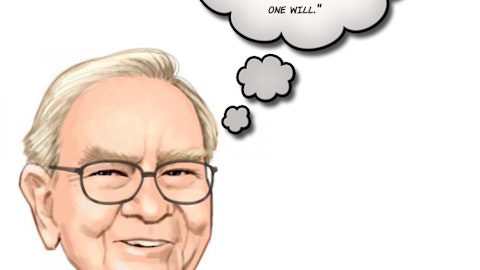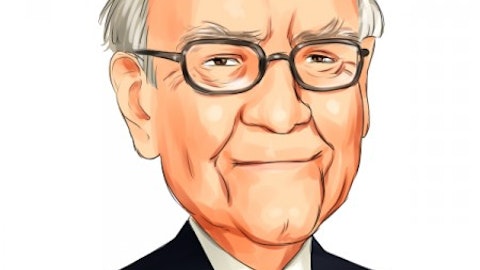Warren Buffett is an iconic figure in the investment space. Over the decades he managed to build an empire around his Berkshire Hathaway holding company. In addition to fully-owned subsidiaries, Mr. Buffett also holds $109 billion in shares of publicly-traded companies, the majority of which provided the “Oracle of Omaha” with impressive returns. Even though, Berkshire Hathaway’s equity portfolio is diversified, a significant position, 46% to be exact, is tied up in financial stocks. Among financial companies that Mr. Buffett is bullish on are several of the United States’ big banks. In a recent interview on CNBC, Mr. Buffett provided his opinion regarding big US banks and whether they work in the current environment or should be split in order to provide more value.

Mr. Buffett considers that as there are different capital requirements based on the size of a firm, a bank, even a big one, can become unprofitable. “You make decent return on equity through leverage,” the investor said. In this way, banks can earn money not only on their capital, but also on their liabilities, which are represented by deposits. In this way, if the value of capital grows relative to the bank’s liability, the returns can reach a level where they are not attractive anymore.
Out of the US’ five largest banks: JPMorgan Chase & Co. (NYSE:JPM), Goldman Sachs Group Inc (NYSE:GS), Bank of America Corp (NYSE:BAC), Citigroup Inc (NYSE:C) and Wells Fargo & Co (NYSE:WFC), Mr. Buffett owns large positions in two banks: Wells Fargo and Goldman Sachs, both holdings being included in Berkshire’s top 10 largest positions in terms of value. Moreover, for the last two years, Wells Fargo & Co (NYSE:WFC) represented Berkshire’s most valuable position. At the end of 2014, the firm held around 463.45 million shares of the bank, the value of the stake amounting to $25.41 billion, accounting for 23% of its equity portfolio. Berkshire also owns the largest stake in Wells Fargo & Co (NYSE:WFC) among institutional investors. In addition, among funds that we track, 10 billionaires held around $27 billion worth of the company’s stock. Taking into account that Buffett’s stake is worth $25 billion, in this perspective the position is even more impressive.
The second big bank in which Mr. Buffett owns a substantial position is Goldman Sachs Group Inc (NYSE:GS). At the end of 2014, the investor held 12.63 million shares, valued at $2.45 billion. Back in 2008, during the financial crisis, Warren Buffett provided a $5.0 billion investment to Goldman Sachs Group Inc (NYSE:GS), the inflow of capital considered to be life-saving for the bank. In addition, the investment from one of the greatest investors brought some confidence back to the market. However, the investment provided the billionaire with great returns. The investor could’ve profited from exercising the warrants with a strike price of $115 and obtained several hundreds of millions in profits. Moreover, the dividend on the preferred stock issued to Buffett amounted to around $500 million a year and totaled $1.64 billion, when Goldman Sachs bought back the warrants. Mr. Buffett initiated a new stake in Goldman Sachs Group Inc (NYSE:GS) at the end of 2013 and since then, the stake remained unchanged at 12.63 million shares. Another big shareholder of Goldman Sachs is Alex Snow‘s Lansdowne Partners, which owned 5.59 million shares as of the end of 2014.

There is a reason why Mr. Buffett likes to invest in big banks and large-cap companies in general. One of the advantages of investing in these banks is the possibility of gaining steady returns over the year without worrying to much about short-term fluctuations. In his last annual letter to Berkshire shareholders, Mr. Buffett outlined some great points about short-term fluctuations of stock prices. The Oracla of Omaha said that the majority of investors should keep their focus on a multi-decade horizon and not pay attention to quotational declines. In this way, their investments will provide significant returns over their investing lifetime and in addition will prove to be less risky than dollar-based securities.
All in all, Mr. Buffett considers that the present banking system is pretty good in the current environment. The video with his interview can be watched below:
Disclosure: None





